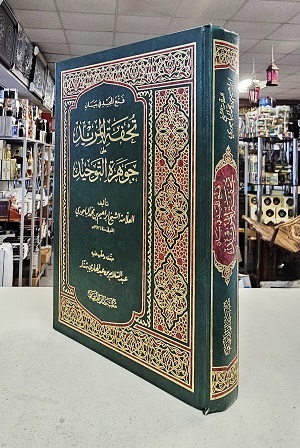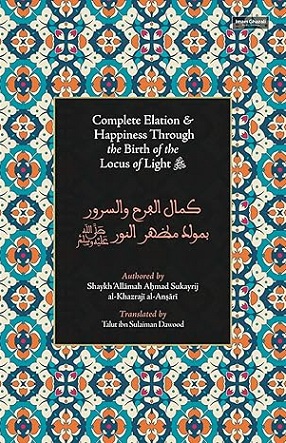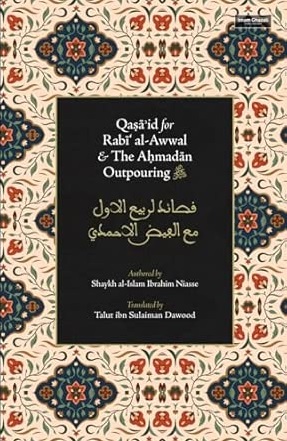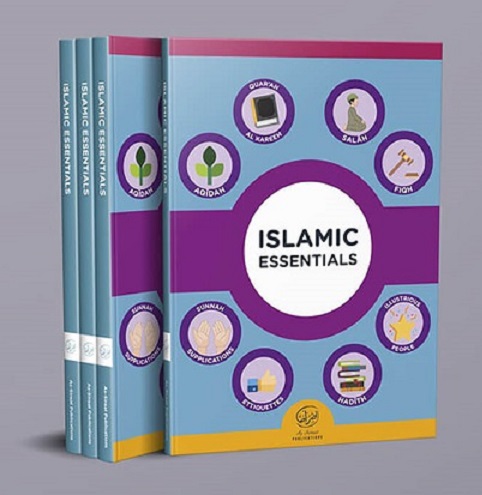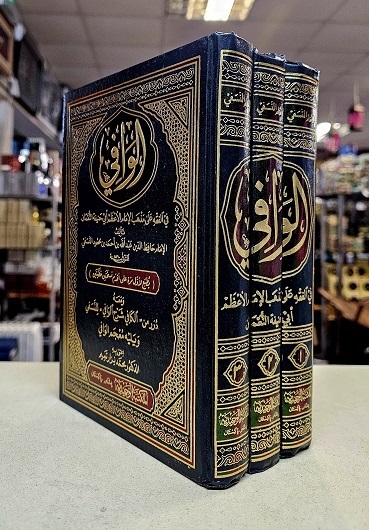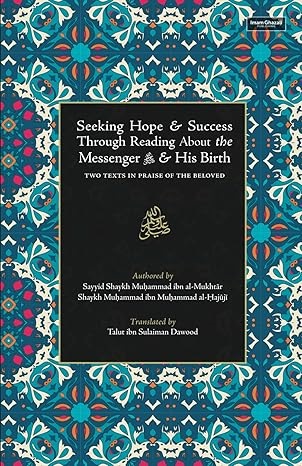The Book of Ascension
to the Essential Truths of Sufism,
Miraj al-tashawwuf ila haqa'iq al tasawwuf :
A lexicon of Sufic Terminology,
English/Arabic,
*[A5+] Paperback - 252 pages,
by
Shaykh Ahmad ibn Ajiba [d.224h],
Translated & Annotated by Mohamed Fouad Aresmouk
& by Michael Abdurrahman Fitzgerald.
Published by Fons Vitae, USA.
Back in Stock December 2020
Description :
The Book of Ascension to the Essential Truths of Sufism (
Miraj al-tashawwuf ila haqa'iq al tasawwuf) is a lexicon of Sufic terminology compiled by the Moroccan scholar and mystic, Shaykh Ahmad ibn 'Ajiba,
may Allah have mercy upon him. It was first begun around the time he entered the Darqawi Order at the hand of its founder, in 1208/1793, and then re-written twelve to thirteen years later after he himself had travelled the Path and became one of its teachers.
The final work, dated 1220/1806 contains 143 Sufic terms for which Ibn 'Ajiba gives succinct but profound definitions, usually including what the term means for someone at the beginning, middle, and end of the spiritual journey.
The main text is enriched by twenty more passages from other works by the same author as well as by the complete text of
al-Mirʿaj in vowelled Arabic text, extensive notes, and indices of persons, terms, Qur'anic verses, and hadith mentioned.
Shaykh Ahmad ibn 'Ajiba,
may Allah have mercy upon him, was a Moroccan Sufi teacher with a vision which far surpassed many of his contemporaries. Being of the Path himself, he felt a deep compassion for those in need of a little illumination and wrote the concise work known as
Mi‘raj al-tashawwuf ila Haqa’iq al-tasawwuf.
Since Ibn ‘Ajība was not the first one to be writing a glossary of essential Sufi terms, he benefitted immensely from the wisdom and experience of his notable predecessors while adding his own in producing this useful work. Hence, this is more than a lexicon; it is accumulated wisdom from the reservoir of experiences; it provides a nuanced understanding of the terminology essential for mapping one’s journey toward God-realisation.
The present translation - the first in English - is completed by two practitioners and scholars who not only are adept in navigating the path of piety; they are also highly knowledgeable of Moroccan Islam and culture. M. F. Aresmouk and M. A. Fitzgerald - whose command of the languages involved in this work is evident from their lucid translation - have produced a scholarly work which is at once accessible and innovative. It will be useful to an advanced seeker and gripping for a novice.
The book includes a helpful introduction which contextualises the work, the author and his motivations, and the historical background necessary for a better understanding of Sufism. It will be indispensable in courses on Islam and comparative mysticism, and a “must read” for those interested in Sufism and/or Islam in the
Maghreb. ---
Irfan A. Omar, Ph.D. Associate Professor of Islam and World Religions
Marquette University.
Table of Contents :
---Acknowledgements,
---Introduction,
------The Life of Ibn Ajiba,
------Writings,
------
Mi'raj al-tashawwuf,
---------Date of Composition,
---------Title,
---------The First
Mi'raj, The second
Mi'raj, and the
Risala,
---------1. Length,
---------2. General Structure of an Entry,
---------3. Other References Cited,
---------4. Levels of Meaning,
---------5. Terms and Material not found in Al-Qushayri's
Risala,
---------6. Purpose,
------Our Work on this Translation.
The Translation :
Miraj al-tashawwuf ila haqa'iq al tasawwuf :
---Author's Introduction.
---[
1]. Sufism (
tasawwuf),
---[
2]. Repentance (
tawba),
---[
3]. Conversion (
inaba),
---[
4]. Fear (
khawf),
---[
5]. Hope (
raja),
---[
6]. Patience (
sabr),
---[
7]. Gratitude (
shukr),
---[
8]. Scrupulousness (
wara),
---[
9]. Detachment (
zuhd),
---[
10]. Dependence on God (
tawakkul),
---[
11]. Contentment and Submission (
rida wa taslim),
---[
12]. Vigilance (
muraqaba),
---[
13]. Self-reckoning and setting conditions (
muhashaba wa musharata),
---[
14]. Love (
mahabba),
---[
15]. Contemplative vision and essential vision (
mushahada wa mu'ayana),
---[
16]. Gnosis (
ma'rifa),
---[
17]. Piety (
taqwa),
---[
18]. Integrity (
istiqama),
---[
19]. Purity of intention (
ikhlas),
---[
20]. Sincerity (
sidq),
---[
21]. Serenity (
tuma'nina),
---[
22]. Longing and ardor (
shawq wa ishtiyaq),
---[
23]. Jealousy (
ghayra),
---[
24]. Magnanimity (
futuwwa),
---[
25]. Will (
irada),
---[
26]. The aspirant (
al-murid),
---[
27]. Spiritual combat (
mujahada),
---[
28]. Sanctity (
wilaya),
---[
29]. Freedom (
hurriyya),
---[
30]. Servanthood (
'ubudiyya),
---[
31]. Satisfaction (
qana'a),
---[
32]. Well-being (
afiya),
---[
33]. Certainty (
yaqin),
---[
34]. The knowledge of certainty, (
'ilm al-yaqin), -----------the Eye of certainty
('ayn al-yaqin), -----------& the Truth of certainty (
wahaqq al-yaqin),
---[
35]. Benefaction (
ni'ma),
---[
36]. Intuition (
firasa),
---[
37]. Character (
khuluq),
---[
38]. Munifence (
jud),
-----------Generosity (
sakha),
-----------Altruism (
wa ithar),
---[
39]. Spiritual poverty (
faqr),
---[
40]. Remembrance (
dhikr),
---[
41]. The moment (
al-waqt),
---[
42]. State and station (
hal wa maqam),
---[
43]. Contraction and expansion (
qabd wa bast),
---[
44]. Passing thoughts and intimate impressions (
khawatir wa waridat),
---[
45]. The ego (
nafs),
-----------the Spirit (
al-ruh),
-----------and the Innermost being (
wa-l-sirr),
---[
46]. Help (
nasr),
-----------Support (
ta'yid),
-----------Protection (
'isma),
-----------Guidance (
hidaya),
-----------Direction (
rushd),
-----------Firmness of purpose (
wa tasdid),
---[
47]. Wisdom (
hikma),
---[
48]. The intellect (
al-'aql),
---[
49]. The affirmation of divine unity (
tawhid),
---[
50]. The affirmation of God's uniqueness (
tafrid),
---[
51]. Supreme Unity (
ahadiyya),
-----------Unicity (
ihad),
-----------Singularity (
fardaniyya),
-----------Unity (
wahdaniyya),
-----------Exclusivity (
wa infirad),
---[
52]. The sublime essence (
al-dhat al-'aliyya),
---[
53]. The dark cloud (
al-'ama),
---[
54]. Effacement and subsistence (
fana' wa baqa'),
---[
55]. Power and Wisdom (
qudra wa hikma),
---[
56]. Separation and unification (
farq wa jam),
---[
57]. The sensory and the intelligible (
al-hiss wa-l-ma'na),
---[
58]. The domain (
al-mulk),
-----------the Dominions (
al-malakut),
-----------and the Omnipotence (
wa-l-jabarut),
---[
59]. Human nature (
nasut),
-----------Divine Nature (
lahut),
-----------the Realm of infinite mercy (
wa-l-rahamut),
---[
60]. Seeking ecstasy (
tawajud),
-----------Ecstatic emotion (
wajd),
-----------The ecstatic Encounter and pure Ecstasy (
wijdan wa wujud),
---[
61]. Taste (
dhawq),
-----------Drinking (
shurb),
-----------Drunkenness (
sukr),
-----------and Sobriety (
wa sahw),
---[
62]. Erasure and affirmation (
mahw wa ithbat),
---[
63]. Covering and illumination (
sitr wa tajalli),
---[
64]. Being present (
muhadara),
-----------Discovery (
mukashafa),
-----------and the Intimate meeting (
wa-l-musamara),
---[
65]. Glimmers (
lawa'ih),
-----------Flashes (
lawami),
-----------Dawnings (
wa tawali),
---[
66]. Surprises and attacks (
bawadih wa hujam),
---[
67]. Change and stability (
talwin wa tamkin),
---[
68]. Nearness and distance (
qurb wa bu'd),
---[
69]. The law (
al-shari'a),
-----------The way (
al-tariqa),
-----------The truth (
wa-l-haqiqa),
---[
70]. The essence and the attributes (
al-dhat wa-l-sifat)
---[
71]. Lights and secrets (
anwar wa asrar),
---[
72]. Consciences and innermost secrets (
dama'ir wa sara'ir),
---[
73]. Breath (
nafas),
---[
74]. Meditation and introspection (
fikra wa nazra),
---[
75]. Witness (
shahid),
---[
76]. The wine (
al-khamra),
-----------The cup (
al-ka's),
-----------Drinking (
wa shurb),
---[
77]. The aspirant (
al-murid),
-----------The needy one (
al-faqir),
-----------The person of blame (
al-mulamati),
-----------The one brought near (
wa-l-muqarrab),
---[
78]. Devotees (
'ubbad),
-----------Ascetics (
zuhhad),
-----------Gnostics (
wa arifun),
---[
79]. The virtuous (
al-salihun),
-----------The saints (
al-awliya'),
-----------The substitutes (
al-budala'),
-----------The front rank (
al-nuqaba'),
-----------The nobles (
al-nujaba'),
-----------The stakes (
al-awtad),
-----------The pole (
wa-l-qutb).
---Appendix I. The Station of
Tawba,
---Appendix II. The Correspondences,
---Appendix III. Biographical Listings.
---Bibliography,
---Index of Qur'anic Verses Cited,
---Index of
Hadith Cited,
---General Index.
---The Complete
Arabic Text of
Mi‘raj al-tashawwuf ila Haqa’iq al-tasawwuf.
More
Sufism books.
*Dimensions : 22.9 x 15.2cm

